Lexus unveils its compact hatchback, the CT 200h
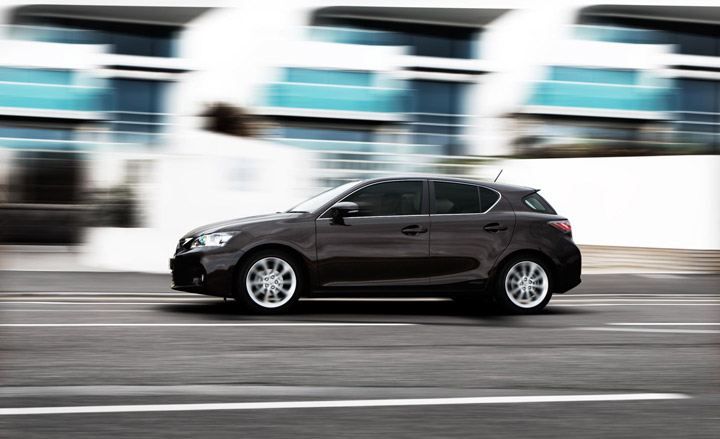
Receive our daily digest of inspiration, escapism and design stories from around the world direct to your inbox.
You are now subscribed
Your newsletter sign-up was successful
Want to add more newsletters?
The past decade has seen Lexus establish itself as an industry leader in bringing advanced technologies to the premium car market. Now the Japanese luxury brand is turning the same thinking to a smaller scale, with the introduction of their first compact hatchback, the newly unveiled CT 200h.
The speed at which Lexus is developing as a brand is glaringly obvious. Just 13 months ago this high-end division of Toyota Motor Corp assembled the world media to display the Lexus LFA (W*130), the company's first attempt at a high performance super-car, pitched directly against established players like Porsche, Ferrari and Aston Martin. Yet just a few weeks ago a similar event was held in the autumnal forests of Chantilly, Paris, to introduce the far more mass market Lexus CT 200h.
You may be wondering how these vastly differing machines can draw even the smallest comparison. The former is a snarling, lightweight, two-seater, capable of over 200mph, while the latter (if driven sparingly) will emit a minimal CO2 reading of 96/km* while rewarding its owner with a combined fuel economy of 68.9mpg.
Although the two cars are undeniably different animals, an understanding of the Lexus philosophy reveals that the two vehicles share an almost identical ambition. With the average Lexus customer's age hovering statically around their mid-fifties, both the LFA and the CT 200h have been tasked with attracting a younger clientele, broadening Lexus's luxury portfolio.
Supercars are a very limited market (just 500 LFAs will be built), but the compact luxury segment is booming. With an on the road entry-level CT 200h priced at £23,485, the company hopes its showrooms will entice customers who might otherwise consider the Audi A3, BMW 1 Series or Volvo C30, when it launches in the UK in Spring 2011.
Underpinning the CT 200h is Lexus's tried and tested hybrid system, here paired to a car with far less weight than their saloons or SUVs. The company is confident enough to include only one engine at launch, lifted from sister company Toyota's Prius and Auris Hybrids models. This second-generation full hybrid system features a 1.8 litre VVT-I petrol engine, which works (independently or in tandem when needed) with a powerful electric motor running off a high performance Nickel battery.
The combined system offers max output of 136hp, allowing a 0-62mph time of 10.3 seconds while the vehicle tops out at 112mph. These are fairly mediocre figures, placing the car firmly in the middle its segment and confirming that the CT 200h was never designed with performance in mind.
Receive our daily digest of inspiration, escapism and design stories from around the world direct to your inbox.
Despite the engine's lethargic nature the smart hatch is capable of operating in an electric only (EV) mode, using battery power alone while generating zero CO2 along with zero NOx emissions, a very welcome option in an urban rush hour situation. Arguably even more impressive is the motor's ability to act as a high output generator - optimizing energy management by recovering kinetic energy under regenerative braking, while storing and replenish the battery - an all together neat solution to typical heat wastage.
The car downscales typical Lexus cues, with a bold and powerful front to create a simple yet elegant dynamism to the apex of the vehicle. To the rear, a pronounced step in the tailgate flows from the muscular rear wheel arches and the beefy rear bumper, giving the hybrid a broad, firmly fixed stance.
Once inside, the brand's trademark interior quality shines through. Confronted with an airy cabin, the driver can expect a sporting and functional driver-focused cockpit, while the passenger will enjoy a tranquil and comfortable journey. We tested a US-specification vehicle, but were assured the finish on European vehicles would be exactly the same.
The more cynical amongst us may conclude that the CT 200h is little more than an embellished Prius (they share the same powertrain). Nonetheless, we feel Lexus is onto a winner, scaling down while ramping up luxury and low-emissions. The CT 200h might not lead its class, but it's a valuable stepping-stone designed to keep the company at the centre of the fast-evolving environment and efficiency-conscious marketplace.
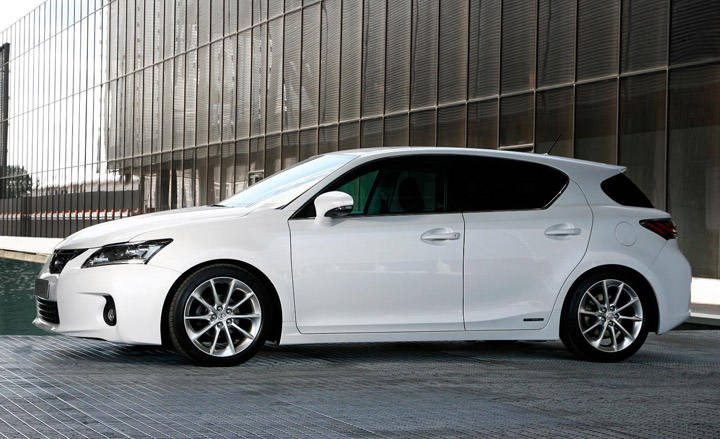
Supercars are a very limited market, but the compact luxury segment is booming. With an on the road entry-level CT 200h priced at £23,485, the company hopes its showrooms will entice customers who might otherwise consider the Audi A3, BMW 1 Series or Volvo C30, when it launches in the UK in Spring 2011.
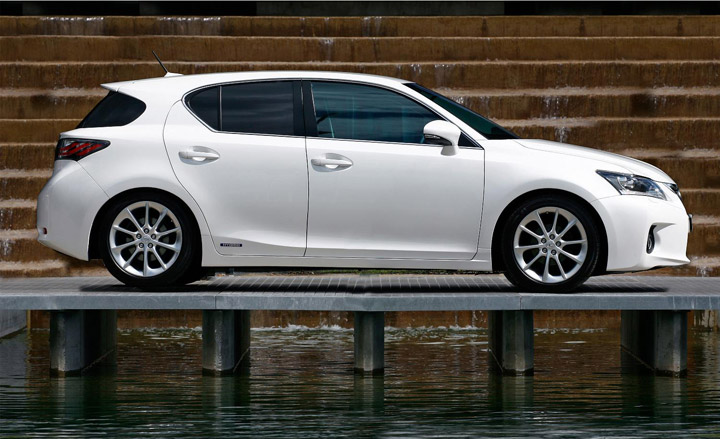
Underpinning the CT 200h is Lexus’s tried and tested hybrid system, here paired to a car with far less weight than their saloons or SUVs.
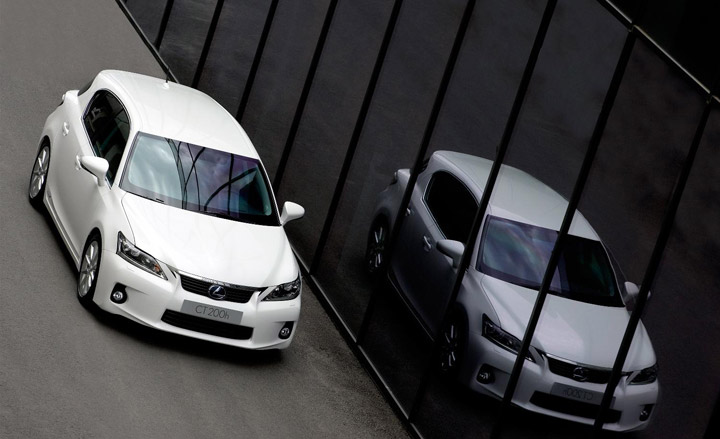
The smart hatch is capable of operating in an electric only (EV) mode, using battery power alone while generating zero CO2 along with zero NOx emissions, a very welcome option in an urban rush hour situation.
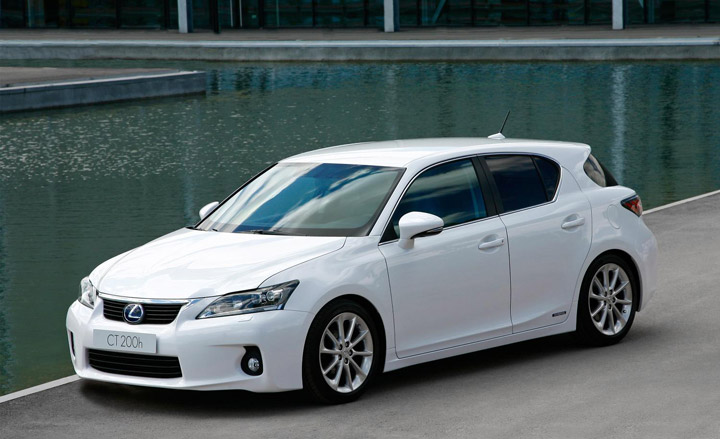
The car downscales typical Lexus cues, with a bold and powerful front to create a simple yet elegant dynamism to the apex of the vehicle. To the rear, a pronounced step in the tailgate flows from the muscular rear wheel arches and the beefy rear bumper, giving the hybrid a broad, firmly fixed stance.
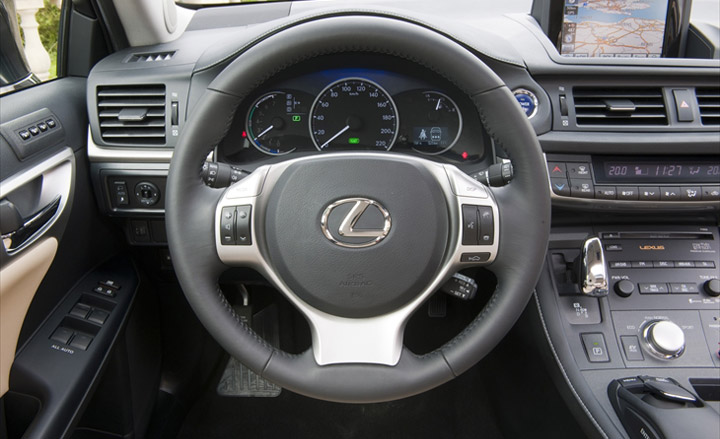
Once inside, the brand’s trademark interior quality shines through. Confronted with an airy cabin, the driver can expect a sporting and functional driver-focused cockpit, while the passenger will enjoy a tranquil and comfortable journey.